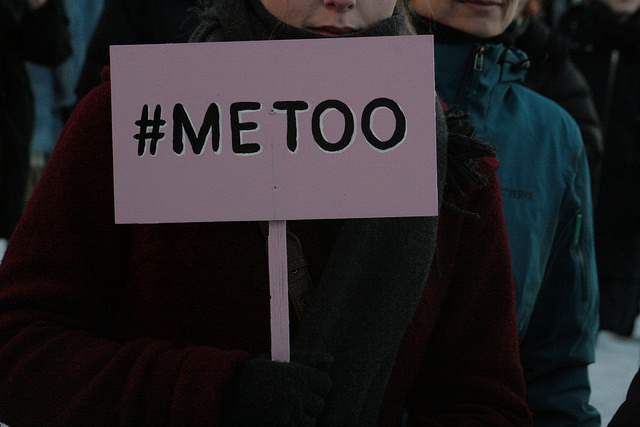“We’ll be watching,” is the last line in Aubrey Hirsch’s comic about the #MeToo movement. As someone who has written about rape culture in bold, important texts like Roxane Gay’s Not That Bad, she knows what she’s talking about, and she’s asking the men in her life to participate more actively in eradicating sexual violence.
As the #MeToo movement has gradually made headway in calling out perpetrators, many have begun to question how we can help to ensure that this movement keeps moving forward. How can we put a stop to the daily behavior that perpetuates rape culture? Hirsch thinks that it’s not only the men who commit abuse who need to be held accountable, it’s the men who say nothing when they see this abuse happening.
“I’m not going to say #MeToo because you already know it’s happened to me, too,” reads Hirsch’s comic. “Instead, I want to say #YouToo to the men in my life and in my feeds because you, too have let this happen. And you are the only ones who can stop it.”
There are so many ways in which people (especially men) passively allow the women around them to suffer because they’re unwilling to stand up. When we fail to confront people who are committing sexual harassment and assault, we allow this behavior to continue and to multiply. The weight of this burden should not be left only to the survivors who endure behavior that violates their boundaries, it should be on all of us to recognize injustice.
Once you recognize this need to step up, there are many ways you can do something. Comedian Cameron Esposito tackled bystander intervention in her recent standup special, Rape Jokes. In it, she told a personal story in which a man prevented her from being attacked.
“A couple years after I was assaulted, I’m standing in front of the dorm that I lived in, and I see, running at me across the parking lot, the dude who had assaulted me,” she says in her special. “And then, the door next to me opened and this dude that was a coworker of mine, he stepped out … He just got in the way. That’s what happened, my coworker stepped in front of me.”
Esposito reflects on what a profound impact this small gesture had on her life. Then, she explains how this kind of action can be replicated in any situation of sexual violence or misconduct.
“You want to leave a legacy?” she asks. “Get in the way. Any way you can, any way you can. Believe people when they tell you this is what happened to them.”
While the meaning of “get in the way” changes depending on the situation, the intention is clear: don’t allow sexual and gender-based violence to happen around you without doing something. Call out people you hear who are making inappropriate comments and rape jokes. Speak up when you see that women are being talked over in your boardroom. Make room for the women in your life to share things with you and ask you to do better. But, maybe most importantly, listen to survivors, believe them, and value their stories.
In May, Roxane Gay released a collection of essays called Not That Bad that examines rape culture from a multitude of perspectives. The essays tells stories ranging from the mild to the horrific, all reflecting the experience of growing up in a world where sexual violence has become the norm. In her introduction she explains why this book is important, and why now.
“This is a moment that will, hopefully, become a movement,” writes Gay. “These essays will, hopefully, contribute to that movement in a meaningful way. The voices shared here are voices that matter and demand to be heard.”
If you’re someone who has never experienced sexual violence and you’re wondering how to become an ally to the #MeToo movement, the first step is to listen. Once we all collectively take a step back and absorb the monumental number of stories that are arising right now, we can understand how to move forward into a better world.


There are no comments
Add yours